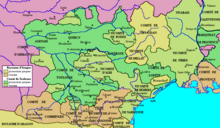 The Albigensian Crusade or the Cathar Crusade (1209–1229) was a 20-year military campaign initiated by Pope Innocent III to eliminate Catharism in Languedoc, in southern France. The Crusade was prosecuted primarily by the French crown and promptly took on a political flavour, resulting in not only a significant reduction in the number of practising Cathars, but also a realignment of the County of Toulouse in Languedoc, bringing it into the sphere of the French crown and diminishing the distinct regional culture and high level of influence of the Counts of Barcelona.
The Albigensian Crusade or the Cathar Crusade (1209–1229) was a 20-year military campaign initiated by Pope Innocent III to eliminate Catharism in Languedoc, in southern France. The Crusade was prosecuted primarily by the French crown and promptly took on a political flavour, resulting in not only a significant reduction in the number of practising Cathars, but also a realignment of the County of Toulouse in Languedoc, bringing it into the sphere of the French crown and diminishing the distinct regional culture and high level of influence of the Counts of Barcelona.
The Cathars originated from an anti-materialist reform movement within the Bogomil churches of Dalmatia and Bulgaria calling for a return to the Christian message of perfection, poverty and preaching, combined with a rejection of the physical to the point of starvation. The reforms were a reaction against the often scandalous and dissolute lifestyles of the Catholic clergy in southern France. Their theology, neo-Gnostic in many ways, was basically dualist. Several of their practices, especially their belief in the inherent evil of the physical world, conflicted with the doctrines of the Incarnation of Christ and sacraments, initiated accusations of Gnosticism and brought them the ire of the Catholic establishment. They became known as the Albigensians, because there were many adherents in the city of Albi and the surrounding area in the 12th and 13th centuries.
Between 1022 and 1163, the Cathars were condemned by eight local church councils, the last of which, held at Tours, declared that all Albigenses should be put into prison and have their property confiscated. The Third Lateran Council of 1179 repeated the condemnation. Innocent III's diplomatic attempts to roll back Catharism were met with little success. After the murder of his legate, Pierre de Castelnau in 1208, Innocent III declared a crusade against the Cathars. He offered the lands of the Cathar heretics to any French nobleman willing to take up arms.
From 1209 to 1215, the Crusaders experienced grand success, capturing Cathar lands and perpetrating acts of extreme violence, often against civilians. From 1215 to 1225, a series of revolts caused many of the lands to be lost. A renewed crusade resulted in the recapturing of the territory effectively drove Catharism underground by 1244. The Albigensian Crusade also had a role in the creation and institutionalization of both the Dominican Order and the Medieval Inquisition. The Dominicans promulgated the message of the Church to combat alleged heresies by preaching the Church's teachings in towns and villages, while the Inquisition investigated heresies. Because of these efforts, by the middle of the 14th century, any discernible traces of the Cathar movement had been eradicated.
No comments:
Post a Comment